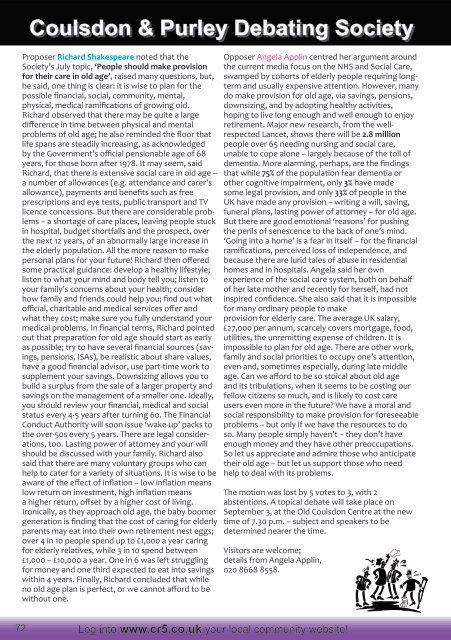CR5 Issue 159 August 2018
A local community magazine delivered free to 11,600 homes every month in the CR5 postcode. Contains local business advertising, interesting reads, What's on in the community and puzzles.
A local community magazine delivered free to 11,600 homes every month in the CR5 postcode. Contains local business advertising, interesting reads, What's on in the community and puzzles.
You also want an ePaper? Increase the reach of your titles
YUMPU automatically turns print PDFs into web optimized ePapers that Google loves.
Proposer Richard Shakespeare noted that the<br />
Society’s July topic, ‘People should make provision<br />
for their care in old age’, raised many questions, but,<br />
he said, one thing is clear: it is wise to plan for the<br />
possible financial, social, community, mental,<br />
physical, medical ramifications of growing old.<br />
Richard observed that there may be quite a large<br />
difference in time between physical and mental<br />
problems of old age; he also reminded the floor that<br />
life spans are steadily increasing, as acknowledged<br />
by the Government’s official pensionable age of 68<br />
years, for those born after 1978. It may seem, said<br />
Richard, that there is extensive social care in old age –<br />
a number of allowances (e.g. attendance and carer’s<br />
allowance), payments and benefits such as free<br />
prescriptions and eye tests, public transport and TV<br />
licence concessions. But there are considerable problems<br />
– a shortage of care places, leaving people stuck<br />
in hospital, budget shortfalls and the prospect, over<br />
the next 12 years, of an abnormally large increase in<br />
the elderly population. All the more reason to make<br />
personal plans for your future! Richard then offered<br />
some practical guidance: develop a healthy lifestyle;<br />
listen to what your mind and body tell you; listen to<br />
your family’s concerns about your health; consider<br />
how family and friends could help you; find out what<br />
official, charitable and medical services offer and<br />
what they cost; make sure you fully understand your<br />
medical problems. In financial terms, Richard pointed<br />
out that preparation for old age should start as early<br />
as possible; try to have several financial sources (savings,<br />
pensions, ISAs), be realistic about share values,<br />
have a good financial advisor, use part-time work to<br />
supplement your savings. Downsizing allows you to<br />
build a surplus from the sale of a larger property and<br />
savings on the management of a smaller one. Ideally,<br />
you should review your financial, medical and social<br />
status every 4-5 years after turning 60. The Financial<br />
Conduct Authority will soon issue ‘wake-up’ packs to<br />
the over-50s every 5 years. There are legal considerations,<br />
too. Lasting power of attorney and your will<br />
should be discussed with your family. Richard also<br />
said that there are many voluntary groups who can<br />
help to cater for a variety of situations. It is wise to be<br />
aware of the effect of inflation – low inflation means<br />
low return on investment, high inflation means<br />
a higher return, offset by a higher cost of living.<br />
Ironically, as they approach old age, the baby boomer<br />
generation is finding that the cost of caring for elderly<br />
parents may eat into their own retirement nest eggs;<br />
over 4 in 10 people spend up to £1,000 a year caring<br />
for elderly relatives, while 3 in 10 spend between<br />
£1,000 – £10,000 a year. One in 6 was left struggling<br />
for money and one third expected to eat into savings<br />
within 4 years. Finally, Richard concluded that while<br />
no old age plan is perfect, or we cannot afford to be<br />
without one.<br />
Opposer Angela Applin centred her argument around<br />
the current media focus on the NHS and Social Care,<br />
swamped by cohorts of elderly people requiring longterm<br />
and usually expensive attention. However, many<br />
do make provision for old age, via savings, pensions,<br />
downsizing, and by adopting healthy activities,<br />
hoping to live long enough and well enough to enjoy<br />
retirement. Major new research, from the wellrespected<br />
Lancet, shows there will be 2.8 million<br />
people over 65 needing nursing and social care,<br />
unable to cope alone – largely because of the toll of<br />
dementia. More alarming, perhaps, are the findings<br />
that while 75% of the population fear dementia or<br />
other cognitive impairment, only 3% have made<br />
some legal provision, and only 33% of people in the<br />
UK have made any provision – writing a will, saving,<br />
funeral plans, lasting power of attorney – for old age.<br />
But there are good emotional ‘reasons’ for pushing<br />
the perils of senescence to the back of one’s mind.<br />
‘Going into a home’ is a fear in itself – for the financial<br />
ramifications, perceived loss of independence, and<br />
because there are lurid tales of abuse in residential<br />
homes and in hospitals. Angela said her own<br />
experience of the social care system, both on behalf<br />
of her late mother and recently for herself, had not<br />
inspired confidence. She also said that it is impossible<br />
for many ordinary people to make<br />
provision for elderly care. The average UK salary,<br />
£27,000 per annum, scarcely covers mortgage, food,<br />
utilities, the unremitting expense of children. It is<br />
impossible to plan for old age. There are other work,<br />
family and social priorities to occupy one’s attention,<br />
even and, sometimes especially, during late middle<br />
age. Can we afford to be so stoical about old age<br />
and its tribulations, when it seems to be costing our<br />
fellow citizens so much, and is likely to cost care<br />
users even more in the future? We have a moral and<br />
social responsibility to make provision for foreseeable<br />
problems – but only if we have the resources to do<br />
so. Many people simply haven’t – they don’t have<br />
enough money and they have other preoccupations.<br />
So let us appreciate and admire those who anticipate<br />
their old age – but let us support those who need<br />
help to deal with its problems.<br />
The motion was lost by 5 votes to 3, with 2<br />
abstentions. A topical debate will take place on<br />
September 3, at the Old Coulsdon Centre at the new<br />
time of 7.30 p.m. – subject and speakers to be<br />
determined nearer the time.<br />
Visitors are welcome;<br />
details from Angela Applin,<br />
020 8668 8558.<br />
72 Log into www.cr5.co.uk your local community website!

















